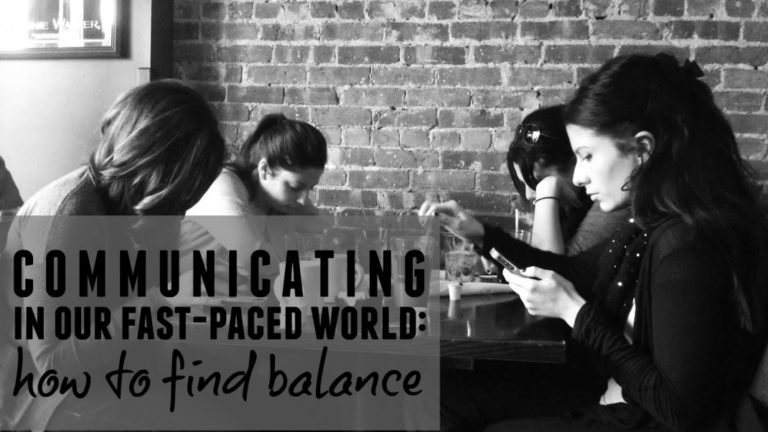Communicating In Our Fast-paced World: How to Find Balance

It’s amazing how quickly the world around us has changed as we progressively move forward in the age of information. Technology has brought many great advancements, but at the same time begs the most basic question: Are we moving further away from the ability to truly connect and communicate with those around us?
Look around you: every day you can bear witness to the impact that smartphones and social media are having on our society. Just this morning, dropping my son off at school, I saw several parents, teachers and children on their phones. How did we survive when we only had land lines? I believe it’s safe to say that a great many of us are having an intimate affair with our phones, utilizing them to “hide” from life and ourselves.
What’s the answer to keeping up with technology without losing yourself along the way?
I strongly believe that you have to keep yourself accountable, making sure that you are not falling prey to the pitfalls of advanced technology. This is extremely important as we already multi-task way too much. And things are only moving faster, so it’s important to find new and safe ways to strengthen our ability to communicate and connect with others.
It’s time to take your own “communication pulse.”
Do you spend more then an hour a day on any social media platform? Are you constantly in a reactive state, which prevents you from listening to others? Do you look at your phone when you are in a conversation with another? Do you answer calls at the dinner table or other valuable family moments? Do you find yourself choosing to text instead of having a conversation? Are you having conversations over text or email that should be done in person? If you have answered yes to any of these questions, then you may have an imbalance.
As much as I appreciate modern technology, it’s changed our ability to communicate on many levels. Communication is becoming a lost art and it’s failing miserably at the hands of our children. Remember when you couldn’t be contacted every moment of the day and there were moments of the day you just got lost in work or play? Remember when you didn’t have to meet an expectation by answering someone immediately? Many of the modern day smartphone users feel compelled to respond right away to a text or email and more often then not this disrupts the flow of your day. Additionally, with less time to process our thoughts, our responses become more of a reaction instead of a conversation.
How does social media contribute to this imbalance?
Social media has many advantages, but there are plenty of drawbacks as well. I believe that many people in our world use Facebook and Twitter as a hiding space. Sitting behind the screen of a computer or phone gives people the courage to say what they want without a filter or compassion. Our emotional intelligence is getting lost in translation and we are slowly losing the ability to be honest with each other and work through difficult conversations; to take a moment and sit with a situation, even when it feels uncomfortable, and move toward communication to solve the problem.
I can’t tell you how many Facebook debates I skip over daily, wondering whether that conversation would be happening if it was in person. The usual answer? No, it wouldn’t, because you would have the connectivity factor and the ability to read body language, which would help ease a conversation that may get heavy.
Where’s the real problem?
The real problem is two-fold. We are losing our ability to communicate with honesty and kindness. Second, if we don’t have the skill to communicate in truth, whether it be a debate or difficult conversation, then how do we expect our children to be able to communicate? This is a mounting concern, as our future generations can text faster then they can talk.
What’s the solution?
Start with awareness. How much time are you on social media, and how much are you on your phone? The amount may shock you, but conscious awareness is the first step to solving our communication problem. Next, come up for air; realize that you do not have to respond immediately to anyone by text or email. Pause, and respond when the time is right for you. Then dig a little deeper: how many times during the day are you derailed because you’re interrupted by a text or email? How much time does each interruption take from your day?
How do we move forward?
Set some family phone rules. Start with some simple limitations, such as only using Facebook on the weekend or certain times throughout the day. Respond to all texts or emails periodically through out the day (three times, say). Oh, and please stop inviting people to play Farmville. 😉
Ask that no phones be on the dinner table or when you are out to eat. Spend time talking and enjoying each other; it goes a long way. Save difficult conversations for person-to-person visits and utilize texts for quick responses, not conversations.
Enjoying the gifts that come with technology is important, but moving forward into a new age with balance is even more important.
How to Weather an Existential Crisis

There comes a time in the lives of many when there is a pause to reflect on the meaning of life. When this moment of Zen turns out to be especially troubling, puzzling, or even discombobulating, we have a name for it — an existential crisis. The symptoms of an existential crisis range from mild wonderment to turning your world on its head and it can feel much more extreme than a prolonged state of confusion or mental health issue.
There are numerous introductions into the potential rabbit hole of an existential crisis, but all of them usually begin with the question “Why am I here?” or “What is the meaning of life?” If you’re going through this, you aren’t alone.
Philosophers have contemplated the purpose of existence and existential anxiety all the way back through our collective past. Socrates had a prescription: “Know thyself.” The Indian sage Ramana Maharshi suggested asking, “Who am I?”
Why do we humans get caught up in this search for meaning, and why do we fear a meaningless life? Better yet, is there any meaning at all? Some people suggest there is a purpose to life that is bound to a sense of well-being, but the masters of enlightenment have long said that we are looking in the wrong direction — outward instead of inward.
Joseph Campbell taught that it’s better to stop searching for the meaning of life and to begin looking for the meaning in life. In other words, life deals us a certain hand of cards, and we need to find what makes us passionate about them. Campbell summed this up in three immortal words: “Follow your bliss” — and the philosopher Soren Kierkegaard said, “Don’t forget to love yourself.”







